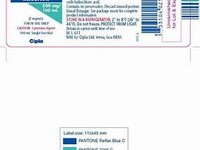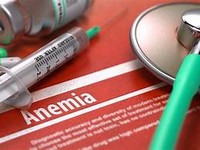Aripiprazole

Aripiprazole
CLINICAL USE
Atypical antipsychotic for the treatment of
schizophrenia
DOSE IN NORMAL RENAL FUNCTION
10–30 mg daily
PHARMACOKINETICS
Molecular weight :
448.4
%Protein binding :
>99
%Excreted unchanged in urine :
<1
Volume of distribution (L/kg) :
4.9
half-life – normal/ESRD (hrs) :
75 (146 in poor
metabolisers)/
Unchanged
DOSE IN RENAL IMPAIRMENT
GFR (mL/MIN)
20 to 50 : Dose as in normal renal function
10 to 20 : Dose as in normal renal function
<10 :
Dose as in normal renal function
DOSE IN PATIENTS UNDERGOING RENAL REPLACEMENT THERAPIES
CAPD :
Not dialysed. Dose as in normal renal function
HD :
Not dialysed. Dose as in normal renal function
HDF/high flux :
Unlikely to be dialysed. Dose as in
normal renal function
CAV/VVHD :
Not dialysed. Dose as in normal renal function
IMPORTANT DRUG INTERACTIONS
Potentially hazardous interactions with other drugs
Anaesthetics: enhanced hypotensive effect
Analgesics: increased risk of convulsions
with tramadol; enhanced hypotensive and
sedative effects with opioids
Antihypertensives: may enhance
antihypertensive effect
Alcohol and other CNS drugs: increased
sedation and other related side effects
Anti-arrhythmics: increased risk of
ventricular arrhythmias with anti-
arrhythmics that prolong the QT interval
Antibacterials: concentration possibly
reduced by rifabutin and rifampicin –
increase dose of aripiprazole
Antidepressants: fluoxetine and paroxetine
possibly inhibit metabolism – reduce dose
of aripiprazole; concentration possibly
reduced by St John’s wort – increase
aripiprazole dose; increased concentration
of tricyclics
Anti-epileptics: antagonises anticonvulsant
effect; concentration reduced by
carbamazepine and possibly reduced by
phenytoin, phenobarbital and primidone –
increase dose of aripiprazole
Antifungals: metabolism inhibited by
ketoconazole and possibly by itraconazole
reduce dose of aripiprazole
Antimalarials: avoid concomitant use with
artemether/lumefantrine
Antivirals: metabolism possibly inhibited
by amprenavir, atazanavir, indinavir,
lopinavir, nelfinavir, ritonavir and
saquinavir – reduce dose of aripiprazole;
concentration possibly reduced by
efavirenz and nevirapine – increase dose
of aripiprazole
Anxiolytics and hypnotics: increased
sedative effects
Sibutramine: increased risk of CNS
toxicity – avoid concomitant use
ADMINISTRATION
Reconstition
–
Route
Oral
Rate of Administration
–
Comments
–
OTHER INFORMATION
Hepatic metabolism and elimination
Can cause QT prolongation
See how to identify renal failure stages according to GFR calculation
See how to diagnose irreversible renal disease
Home









